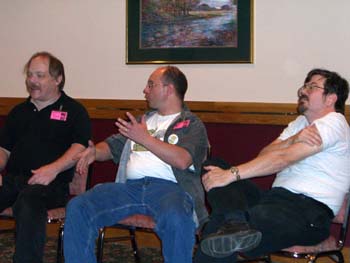I thought the name of this panel hinted at the lack of preparedness on the part of organizers, and given the trouble they've been through this year it would have been entirely understandable. But I was wrong: the title was deliberate. The purpose of this panel was to get Eric Raymond, Howard Tayler and Steve Jackson (THE Steve Jackson of Steve Jackson's Games) to just talk about anything. This turned out one of the most entertaining panels I've been to at any convention. That's a testimonial to the personalities of the above-mentioned three panelists. They have enough improvisational power to turn a topicless discussion into a blast.
It turns out Eric Raymond has come up with something like a language for generating games, where you plug the parameters in and it generates a game for you. It could possibly come up with 20 million games. (They have gotten on the game topic because Howard Taylor said to Steve Jackson that he came up with an idea of a game based on his web-based comic Schlock Mercenary, but he doesn't know how to pitch game ideas.)
They talk about science fiction's influence on the open source movement and geek culture in general, but they don't go anywhere with it beyond a few amusing tidbits / factoids.
Around 1991 -- 1992 Howard Tayler wrote a "prophetic" science fiction story where someone accesses a network through a device the size of a cordless phone (not wireless, he points out, cordless! Oh, those were the days...) that one can carry in their hand. The network can be accessed from public points "all over the place". So it seems this might have been the one and only documented case of science fiction actually predicting the future.
The unintended consequence of the proliferation of communications to the literary world is that one can no longer write plots where a character disappears and is cut off from all communication or is unable to call for help.
Another of the ideas Howard recently came up with is a card for the Illuminati game, which was inspired or counterinspired by the Microstuff card, which represents an evil company. Howard's card, named Open GNUnix, would represent open source, and it would have an opposite alignment than Microstuff. The first is conservative, straight, criminal. Open GNUNix is liberal, weird, fanatic. He took a Gnu head and put it on a penguin body, so that there's something in it card to offend everybody, starting from Stallman...
But one of the most interesting things ESR said was that in his opinion, in the future everyone's job will be performance art. That will be a natural consequence of rising levels of living, of rising wealth in the society. In what sense? Well, someone in the audience immediately mentions that his work -- tech support -- already is performance art. 80% of it is spent soothing the customer. Everybody laughs, but Eric actually meant something else. Basicaly, you will make money by being interesting, by being a personality. That's how Eric Raymond makes a living right now, and to some extent so does Howard Tayler, who lives off of ad revenue from his web comic. As an example to illustrate his statement, Eric Raymond points out that people click on the ads on Howard's page because they are implicitly "endorsed" by Howard. The cachet of his personality makes whatever is being advertised attractive to the viewers. Or so Eric thought.
Then they veer towards lighter subjects of Chupa Queso -- Howard's invention (more about it tomorrow) and capsaicin, one of Eric's favorite things. Eric remembers an experiment in which volunteer pepperheads were injected with a drug that blocks endorphins, and they didn't like their hot food anymore! It demonstrated that people's liking of hot food is due to the capsaicin release.
In the picture (click for a bigger image): Left to right: Eric Raymond, Howard Tayler, Steve Jackson.
Here are more posts from Linucon 2005.





No comments:
Post a Comment